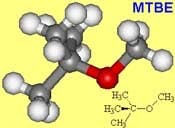On behalf of Pennsylvania Governor Edward G. Rendell, Department of Environmental Protection (DEP) Secretary Kathleen A. McGinty urged Congress to oppose the inclusion of a "safe harbor" provision in U.S. energy legislation that essentially would grant manufacturers of methyl tertiary butyl ether (MTBE) immunity from claims that the fuel additive is "defective in design or manufacture" and seriously undermine efforts to clean up groundwater and surface water contaminated by MTBE.
"If Congress decides to determine by legislative fiat what is or is not defective, it sets a precedent that in effect renders irrelevant any legitimate, substantial scientific and medical evidence regarding the health hazards of a dangerous product," McGinty said.
In a letter to Congress, McGinty urged opposition of the MTBE immunity provision in the energy bill. The House and Senate have formed a conference committee to resolve differences between the measures each chamber has passed and to put forth compromise legislation for approval.
Scientific evidence has established that MTBE poses risks to human health. MTBE is absorbed rapidly and extensively from the respiratory and gastrointestinal tracts of humans. The Environmental Protection Agency (EPA) has classified MTBE as a possible human carcinogen on the basis of studies that show MTBE to be a carcinogen in animals. Health complaints related to MTBE have included headaches, dizziness, irritated eyes, burning of the nose and throat, coughing, disorientation and nausea.
MTBE also is readily soluble in water and migrates quickly through groundwater. This renders the cleanup of contamination from leaking underground storage tanks much more difficult and expensive. MTBE has caused extensive contamination of both groundwater and surface water across the country, including Pennsylvania, where the southeastern portion of the state has been particularly affected.
"By granting manufacturers immunity for the problems caused by MTBE, Congress is turning its back on environmental protection and public health," McGinty said.
A nationwide study by the U.S. Geological Survey found MTBE in 86 percent of wells sampled in industrial areas, 31 percent sampled in commercial areas, 23 percent in residential areas and 23 percent in areas of mixed urban land use, parks and recreational areas.
McGinty noted that granting such immunity from liability could impede efforts to secure the cleanup of MTBE contamination. State and federal funding for such cleanups is already limited at best; statutory remedies against the manufacturers also are limited. Common law claims against manufacturers, seeking either injunctive or monetary remedies, provide important tools to clean up MTBE contamination.
"This provision would establish an extremely troubling precedent in which Congress legislatively determines that harmful chemical compounds are not defective," McGinty said. "Not only would it protect the MTBE manufacturing industry from liability and undermine state and private efforts to remove widespread contamination to our soil and water, but it also would lead to numerous similar requests from other companies seeking immunity from liability for manufacturing dangerous products regardless of the risks to public health."
Source: Pennsylvania Department of Environmental Protection


